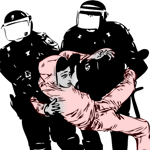The existing anti-terrorist legislation already goes too far!
In October, 2001, the first so-called anti-Terrorism legislation was passed by the Liberal Party following the beginning of George Bush’s “War on Terror.” The expanded powers were highly controversial due to widely perceived incompatibility with the Canadian Charter of Rights and Freedoms, in particular for the Act’s provisions allowing for ‘secret’ trials, preemptive detention and expansive security and surveillance powers. While some of the bill’s provisions to do with preventative arrest and investigative hearings expired on in 2007, and the House of Commons subsequently voted 159-124 against renewing the provisions, the Conservatives re-introduced these aspects of the legislation in 2013 shortly after the “Boston Bombings.”
Our party’s statement from October 2001 is below:
The government’s “Anti-Terrorism” Bill (C-36), introduced into the House of Commons October 15, should set off alarm bells with all democratic-minded Canadians. C-36 would strip away many of our fundamental rights and legal protections, all in the name of ‘protecting’ Canadians from terrorist threats or attacks. Worse, it would create a legal and political framework which would be used to further intimidate and stifle political dissent in this country, and help to whip up a ‘cold war’ atmosphere of fear, paranoia and witch hunts.
The public is being told that C-36 is urgent and required to provide the tools needed to fight the scourge of terrorism in our country. And yet, many experts agree that the legal means to combat terrorism is already essentially in place, and that the new law enforcement ‘tools’ that would be provided by this Act are excessive, unnecessary, and open to widespread abuse by the Canadian state.
The draconian measures include “preventative detention” that would allow people identified at suspects or ‘potential’ terrorists to be imprisoned for up to 12 month without a trial or conviction; “investigative hearings” in which individuals are stripped of their right to silence and forced to ‘rat’ on their friends, relatives or co-workers on pain of their own incarceration; secret trials; the shredding of all privacy laws and protections; the extension of police and CSIS powers; etc.
Taken together, these reactionary changes would constitute the single most sweeping attack on the democratic and legal rights of Canadians since the War Measures Act of the early 20th century.
Furthermore, there are no reasonable grounds to believe that such measures will have any significant effect on combating the real terrorists, any more than is the case under present-day law. The real victims of this legislation will be the broad popular movements of the people, especially those that promote militant political action in opposition to the right-wing, neoliberal and militarist policies of the imperialist powers, including Canada.
The most damning and starkly political part of the legislation relates to how “terrorism” is to be defined under law. According to the bill, “terrorism” would involve any action or intention “of a political, religious or ideological” character that causes death or endangerment of a person’s health. But it also includes actions which “cause substantial property damage” or which “cause serious interference with or disruption of and essential service, facility or system”.
Such a sweeping definition covers virtually all forms of militant resistance or armed struggle. As Canadian Civil Liberties Association president Alan Borovoy pointed out recently, if this bill had been in place 10 years ago, Canadians who supported Nelson Mandela and the ANC, or who raised funds for the anti-apartheid struggle in South Africa, would have been called ‘terrorists’ and subject to arrest and conviction.
In fact, the definition is so broad that all those who engage in militant forms of resistance — peace supporters who march without a permit, anti-globalization activists who occupy buildings or try to shut down meetings like the WTO conference in Seattle, workers who refuse to abide by unjust labour laws — all these forms of struggle could be termed ‘terrorist’ under this definition.
This legislation is an extremely grave attack on democracy in Canada. Its sponsors and promoters hope that by a combination of parliamentary bullying and taking advantage of current public sentiment, shaken by the September 11th attacks and by current anthrax scare, they will be able to force C-36 into law quickly, and with little scrutiny or meaningful resistance.
This must not happen. It is imperative that all those Canadians who genuinely cherish democratic principles and practices – Canadians from every walk of life, and with views spanning the political spectrum – should unite in demanding that this legislation be withdrawn.
Despite Liberal blustering to the contrary, the “anti-terrorism” bill is very vulnerable. A broad array of legal professionals, constitutional experts, political parties and social activists has sharply condemned the bill. Even Liberal backbenchers, and the editorial department at the Globe & Mail are squeamish about several of the most draconian and anti-democratic sections of the Act.
This indicates that it is possible to defeat this legislation, provided a broad front of democratic forces can come together quickly and decisively to mobilize the Canadian people against this horrendous attack on their rights and freedoms. Our Party is fully committed to that goal and will work with all others in helping to realize such a broad front to defend democracy.
Central Executive Committee
Communist Party of Canada
October 27, 2001

